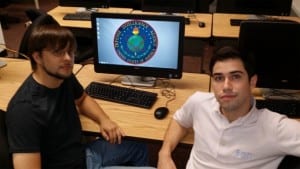New UCF Center to Educate Future Intelligence Workforce

Kevin Sopko, left, and Rodolfo Padilla, political science majors, are building student interest in UCF’s new Community Center of Academic Excellence. They hope to offer students the opportunity to participate in events such as a national security simulation held annually at West Point.
The University of Central Florida has been awarded a $1.85 million grant to establish a center focused on intelligence and national security within the department of political science. The center will help prepare the workforce for the intelligence community of the future.
UCF will become one of only a handful of universities nationwide to house an Intelligence Community Center of Academic Excellence. The grant from the Defense Intelligence Agency is the largest ever received by political science at UCF.
The center, led by Mark Schafer, a professor of political science, will offer students state-of-the-art curriculum in national intelligence and security and will also include a speaker series that will attract nationally and internationally known experts in the field.
It will also offer students opportunities for summer educational programs and study abroad programs.
“The long-term intention is to educate students and give them opportunities to make connections in the intelligence and security communities to create a strong future intelligence workforce,” Schafer said.
Students are already establishing a registered student organization focused on intelligence and national security and are looking forward to having a program in the discipline, said Kevin Sopko, a senior in political science.
A high school student in New Jersey at the time of the 9/11 attacks, Sopko said the incident motivated him to become involved with the model United Nations at UCF and to pursue disarmament and security studies.
Rodolfo Padilla, a political science junior who is studying to be an attorney, said that the focused program will help students get the education they need to consider intelligence and national security as career options.
UCF’s status as one of only a few universities in the country to offer a Ph.D. program in security studies and the university’s strong connections to intelligence and national security communities contributed to its selection as a center, Schafer said.
“Based on the reputation UCF is achieving nationally for the strength and depth of our programs and the diversity of our student population we were a natural fit,” he said.
Michael Macedonia, an assistant vice president for research & commercialization at UCF and the co-leader of the project, said connections between the university and intelligence communities at nearby facilities such as Patrick Air Force Base and MacDill Air Force Base will help the center integrate existing practices with academic benchmarks.
Macedonia, who has worked for government agencies including the Office of the Director of National Intelligence and U.S. Army, said the Intelligence Community Center of Academic Excellence project was mandated by Congress in 2005 in recognition of the need to develop a stronger and more diverse national security workforce for the future.
To view the original article please visit UCF Today.
